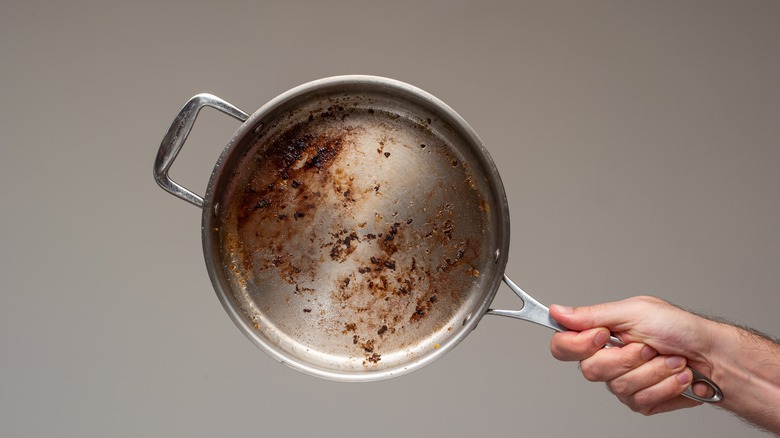How To Clean Stainless Steel Pans And Save Time Scrubbing
You have a lot of options when it comes to cookware. Plenty of people swear by cast iron, while others love the vintage look of copper. Some people will even go with aluminum or rely largely on stoneware vessels. But the old standby, the classic that keeps coming back for cost-efficiency and ease of use, is stainless steel.
One of the best things about stainless steel is how easy it is to clean relative to something like cast iron, where people might tell you caring for it requires something akin to a ritual ceremony to the elder gods. By contrast, stainless steel is easy, right? Well, it's easier, sure, but that doesn't mean it doesn't have its own specific requirements. They may be easier than cast iron, but you still shouldn't be lazy and just throw them in the dishwasher. Take your time and do it by hand — and never use anything too abrasive.
You still need to care for your steel pans
Cleaning stainless steel doesn't cause people to act like you've committed a mortal sin, if it touches water and soap, (looking at you again, cast iron). And, a lot of them will say "dishwasher-safe," so you might be tempted to just throw them in there. But, while it's technically safe to put them through a wash cycle, that doesn't mean it's the best idea to do so — exposure to excessive humidity and abrasive cleaning materials means pans can wear out a lot faster if you're not cleaning them by hand.
The first step in the process is one you might be skipping even if you do already wash by hand: Use a paper towel to mop up all the excess grease in the pan. This is good for your pans because it means less of an oily mess to scrub away, but it's also good for your plumbing, as less fat and oil will wind up going down the drain.
With stainless steel, you should always be gentle
From there, the process is as simple as hot soapy water and a soft sponge (preferably while the pan is still hot); don't use something abrasive like steel wool, because you're likely to damage your pan. If you've waited too long and there are baked-on bits, you might be tempted to go with a scouring pad, but that's a mistake. Instead, rely on a mixture of water, dish soap, and that classic kitchen cleaner helper: baking soda. You can use baking soda to clean everything from grills to tupperware, so it's no surprise it makes an appearance here. Then, it's back to that same soft sponge.
The key to preserving all your cooking tools for as long as possible is just time and care. The better you take care of your pots, pans, grills, and whatever else, the better they'll take care of you.


